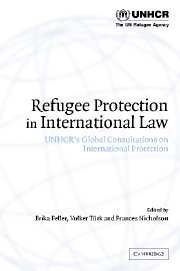Book contents
- Frontmatter
- Contents
- List of annexes
- Notes on contributors and editors
- Foreword
- Preface
- Acknowledgments
- Expert roundtables and topics under the ‘second track’ of the Global Consultations
- Table of cases
- Table of treaties and other international instruments
- List of abbreviations
- Part 1 Introduction
- Part 2 Non-refoulement (Article 33 of the 1951 Convention)
- Part 3 Illegal entry (Article 31)
- Part 4 Membership of a particular social group (Article 1A(2))
- Part 5 Gender-related persecution (Article 1A(2))
- Part 6 Internal protection/relocation/flight alternative
- Part 7 Exclusion (Article 1F)
- Part 8 Cessation (Article 1C)
- 8.1 Cessation of refugee protection
- 8.2 Summary Conclusions: cessation of refugee status, expert roundtable, Lisbon, May 2001
- 8.3 List of participants
- Part 9 Family unity (Final Act, 1951 UN Conference)
- Part 10 Supervisory responsibility (Article 35)
- Index
8.2 - Summary Conclusions: cessation of refugee status, expert roundtable, Lisbon, May 2001
Published online by Cambridge University Press: 28 August 2009
- Frontmatter
- Contents
- List of annexes
- Notes on contributors and editors
- Foreword
- Preface
- Acknowledgments
- Expert roundtables and topics under the ‘second track’ of the Global Consultations
- Table of cases
- Table of treaties and other international instruments
- List of abbreviations
- Part 1 Introduction
- Part 2 Non-refoulement (Article 33 of the 1951 Convention)
- Part 3 Illegal entry (Article 31)
- Part 4 Membership of a particular social group (Article 1A(2))
- Part 5 Gender-related persecution (Article 1A(2))
- Part 6 Internal protection/relocation/flight alternative
- Part 7 Exclusion (Article 1F)
- Part 8 Cessation (Article 1C)
- 8.1 Cessation of refugee protection
- 8.2 Summary Conclusions: cessation of refugee status, expert roundtable, Lisbon, May 2001
- 8.3 List of participants
- Part 9 Family unity (Final Act, 1951 UN Conference)
- Part 10 Supervisory responsibility (Article 35)
- Index
Summary
The second day of the expert roundtable addressed the cessation clauses of the 1951 Convention relating to the Status of Refugees, based on two discussion papers, ‘Current Issues in Cessation of Protection under Article 1C of the 1951 Convention and Article I.4 of the 1969 OAU Convention’, by Professor Joan Fitzpatrick and ‘When is International Protection No Longer Necessary? The “Ceased Circumstances” Provisions of the Cessation Clauses: Principles and UNHCR Practice, 1973–99’, by Rafael Bonoan. Participants were also provided with the UNHCR Guidelines on the Application of the Cessation Clauses and written contributions from: the Government of the Netherlands; Judge Bendicht Tellenbach, Swiss Asylum Appeal Commission; and Dr Penelope Mathew, Australian National University. NGO and other input was fed into the process in the course of the discussion. Professor Walter Kälin moderated the discussion.
The following Summary Conclusions do not represent the individual views of each participant or necessarily of UNHCR, but reflect broadly the issues emerging from the discussion.
State and UNHCR practice with respect to the cessation clauses
One of the objectives of the discussion was to understand why, overall, the cessation clauses under the 1951 Convention are little-used provisions by States. There was therefore considerable discussion across the range of issues which impact on the application of the cessation clauses. The emergent focus of the discussion was on the more complex issue of the application of Articles 1C(5) and (6).
[…]
- Type
- Chapter
- Information
- Refugee Protection in International LawUNHCR's Global Consultations on International Protection, pp. 545 - 550Publisher: Cambridge University PressPrint publication year: 2003



